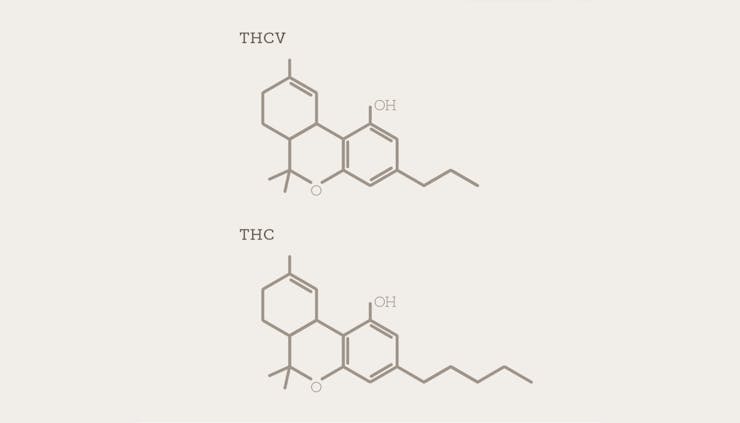THCV, or Tetrahydrocannabivarin, is a cannabinoid found in some varieties of cannabis. First discovered in 1971, this chemical is relatively rare but has become more popular over the years, leading cultivators to focus on breeding specialized THCV strains to meet demand. THCV is similar to THC in molecular structure and psychoactive effects it produces.
“THCV is my favorite cannabinoid.”
“I never feel hungry after I smoke a high THCV strain.”
What is THCV?
THCV, or Tetrahydrocannabivarin, is a cannabinoid found in some varieties of cannabis. First discovered in 1971, this chemical is relatively rare but has become more popular over the years leading cultivators to focus on breeding specialized THCV strains to meet demand. As the name indicates, THCV is similar to THC: They have a very similar molecular structure and both create psychoactive effects. But THCV also differs from THC in important ways; it is know as an appetite suppressor and anxiety reducer.
What is THCV used for?
People use THCV for a variety of different medical uses. While human studies are limited, research suggests it could be helpful for a number of different issues.
THCV is commonly used to reduce anxiety relative to THC, as THC is known to cause anxiety in some consumers. Some studies have found that when THC and THCV are combined, consumers have less anxiety than with THC alone.
THCV’s appetite-suppressing qualities have also led many to use it as a diet drug to help reduce obesity. Other studies suggest THCV could be helpful for type two diabetes, specifically with regulating blood sugar control and insulin production. GW pharmaceuticals is even working on a THCV-based medicine for type 2 diabetes.
Other studies suggest THCV might help treat conditions like epilepsy, Parkinson’s Disease, and osteoporosis.
How do you use THCV?
If you are looking to add more THCV into your cannabis routine, it can be more or less difficult finding it depending on where you live. Some areas with legal cannabis programs have products designed specifically to meet the demand for high THCV.
If you don’t see any products in your area, some strains are also naturally higher in THCV, or have been bred to have high THCV. Look for strains like Durban Poison, Doug’s Varin or Pineapple Purps, and confirm their THCV levels by looking at lab test results of the product.
